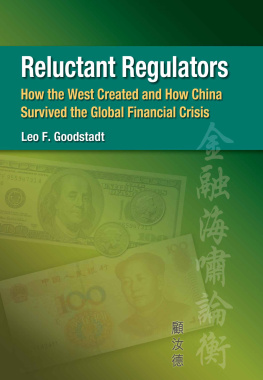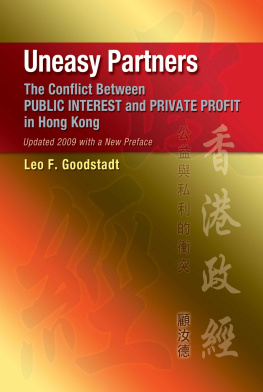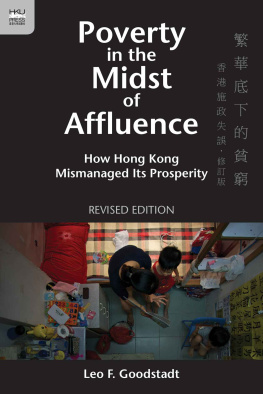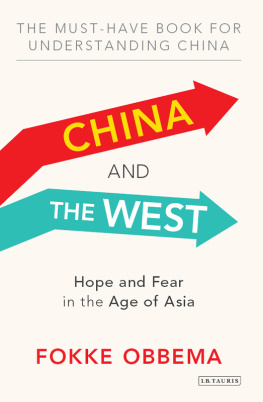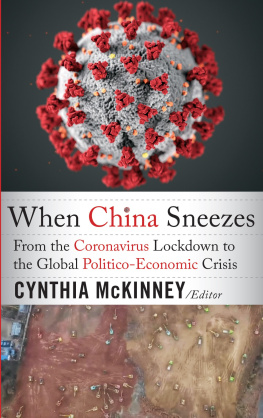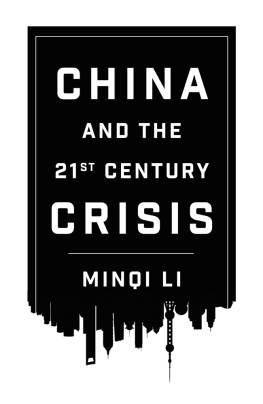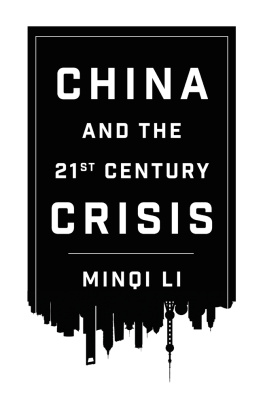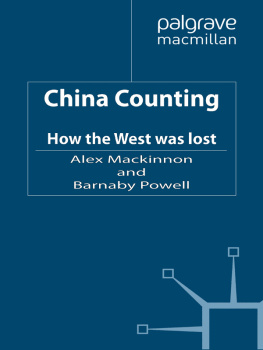Leo F. Goodstadt - Reluctant Regulators - How the West Created and How China Survived the Global Finanical Crisis
Here you can read online Leo F. Goodstadt - Reluctant Regulators - How the West Created and How China Survived the Global Finanical Crisis full text of the book (entire story) in english for free. Download pdf and epub, get meaning, cover and reviews about this ebook. year: 2011, publisher: Hong Kong University Press, genre: Politics. Description of the work, (preface) as well as reviews are available. Best literature library LitArk.com created for fans of good reading and offers a wide selection of genres:
Romance novel
Science fiction
Adventure
Detective
Science
History
Home and family
Prose
Art
Politics
Computer
Non-fiction
Religion
Business
Children
Humor
Choose a favorite category and find really read worthwhile books. Enjoy immersion in the world of imagination, feel the emotions of the characters or learn something new for yourself, make an fascinating discovery.
- Book:Reluctant Regulators - How the West Created and How China Survived the Global Finanical Crisis
- Author:
- Publisher:Hong Kong University Press
- Genre:
- Year:2011
- Rating:5 / 5
- Favourites:Add to favourites
- Your mark:
- 100
- 1
- 2
- 3
- 4
- 5
Reluctant Regulators - How the West Created and How China Survived the Global Finanical Crisis: summary, description and annotation
We offer to read an annotation, description, summary or preface (depends on what the author of the book "Reluctant Regulators - How the West Created and How China Survived the Global Finanical Crisis" wrote himself). If you haven't found the necessary information about the book — write in the comments, we will try to find it.
Reluctant Regulators - How the West Created and How China Survived the Global Finanical Crisis — read online for free the complete book (whole text) full work
Below is the text of the book, divided by pages. System saving the place of the last page read, allows you to conveniently read the book "Reluctant Regulators - How the West Created and How China Survived the Global Finanical Crisis" online for free, without having to search again every time where you left off. Put a bookmark, and you can go to the page where you finished reading at any time.
Font size:
Interval:
Bookmark:

Reluctant Regulators
Reluctant Regulators
How the West Created and How China Survived the Global Financial Crisis
Leo F. Goodstadt

Hong Kong University Press
14/F Hing Wai Centre
7 Tin Wan Praya Road
Aberdeen
Hong Kong
www.hkupress.org
Hong Kong University Press 2011
ISBN 978-988-8083-25-1 (Hardcover)
ISBN 978-988-2206-48-9 (eBook)
All rights reserved. No portion of this publication may be reproduced or transmitted in any form or by any means, electronic or mechanical, including photocopy, recording, or any information storage or retrieval system, without prior permission in writing from the publisher.
British Library Cataloguing-in-Publication Data
A catalogue record for this book is available from the British Library.
First printed 2011
First eBook 2011
10 9 8 7 6 5 4 3 2 1
Contents
Preface
It would be hard to find a better vantage point from which to survey the international financial crisis of 200709 than Hong Kong. The unparalleled global economic growth that preceded the disaster had followed three decades of a worldwide trend towards the liberalisation of trade and finance at both the national and international levels. Protectionism and state-planning went out of favour, even in a nation previously wedded to the most anti-capitalist ideology as China had been with astonishing growth as its reward.
Thus, laissez-faire, Hong Kongs long-ignored formula for self-generated, sustained growth, became a global fashion. Its own economic performance had several claims to fame starting with the fastest rise from poverty in Asian history. Thanks to its industrial take-off after World War II, it had become the worlds largest supplier of light industrial products by the mid-1960s. Its dominance of the world garment trade continued till the end of the century despite the relocation of virtually all its manufacturing facilities to southern China in response to Deng Xiaopings 1978 liberalisation policies.
Less well known is its role as Asias leading international finance centre. For much of the previous century, Hong Kong was the location for Asias freest financial markets and provided the regions most liberal environment for international banks. Between 1950 and 1971, it had also been the base from which China could safely carry out international financial and commercial transactions despite the economic embargoes of the Cold War. After the nation adopted its open door policies in 1978 and embarked on economic liberalisation, Hong Kong grew in stature as an international financial centre. Yet, until 1986, financial crises were a recurrent feature of the business landscape, aggravated by the mounting vulnerability of the Hong Kong dollar from the mid-1970s. The susceptibility of its financial markets to asset bubbles especially in the property sector was a major feature of Hong Kongs history.
The colonial administration of that period was extremely reluctant to accept responsibility for financial stability and introduced regulatory reforms to halt illegal and imprudent banking behaviour piecemeal and as minimally as possible. The United Kingdom, although constitutionally responsible for the good government of Hong Kong, preferred not to get involved. Nevertheless, despite the crises and scandals, the financial sector went from strength to strength, attracting an influx of major foreign banks and an expansion of Chinese state banks activities. By 1985, however, the case for regulation had become irresistible as bank failures could be traced to the gross professional incompetence of bank owners and executives as well as to their illegal activities. The government was now forced to abandon its preference for the lightest touch regulation and its aversion to intervention in the markets as mounting public outrage at the regulators failures made further bank bailouts too expensive politically.
From a personal point of view, I benefitted from an ample supply of excellent mentors as a young member of the Far Eastern Economic Review s editorial team from 1966 to 1976. Political leaders, officials and businessmen around Asia were willing to explain events and policies to me principally out of an awareness that if journalists are misinformed, their output can undermine depositor and market confidence. Thereafter, access to policy-makers and industry leaders expanded when I reported for Euromoney and Asiabanking on financial developments in Hong Kong and the Chinese Mainland, which were of growing international interest.
One group of bank executives deserves to be identified individually. The speed of Chinas emergence as a major participant in global financial as well as export markets can be attributed to the personal qualities of its bankers throughout the first 30 years of the Peoples Republic. From 1949 to 1978, the capitalist world and its ways were targets for relentless condemnation by the Chinese Communist Party, and contacts with foreign firms and individuals could be politically perilous. Nevertheless, managers from Chinas state banks in Hong Kong, many of them from the Shanghai business lite whose relatives on the Mainland were being punished for their class origins, followed the line of Prime Minister Zhou Enlai and maintained connections with their foreign counterparts. As a result, Chinas links with the worlds banking system were never severed completely, and thus the obstacles to normalising financial relations with the outside world in the 1970s were less daunting than would later be the case for the former Soviet Bloc. Among those involved in preserving this access to capitalism to whom I am personally indebted were: Li Tsu-tsan (Nanyang Commercial Bank), P. L. Chen (Kincheng Banking Corporation), C. S. Yao (China Development Finance and Sin Hua Trust & Savings Bank), Nelson Tsao (also Sin Hua), Shu Tse-wong (Bank of China and Nanyang Commercial Bank) and Wang Deyan (Bank of China).
The constraints and the attractions of a rising Anglo-American culture a major focus of this book were a regular theme for my editors. Among the key issues were the globalisation of HSBC as it struggled successfully to acquire an American presence and tried but failed in its first bid to gain direct entry to British banking; the speed with which the American money centre bank became the model for the rest of the industry; the threat perceived by New York and London from the burgeoning Japanese banks; the constant complaints from American bankers about Asian discrimination; and the prolonged indifference to Asian opportunities of British bankers.
I also had extensive but usually unanticipated access to banking failures. Several of those who were happy to be interviewed were later ruined in the financial crises of those decades. Among them were men who brought down respected Chinese family banks in scandalous circumstances and prominent executives from British, German, French and Malaysian financial institutions who went to prison or fled from justice. There were colonial officials investigated for corruption and, very occasionally, successfully prosecuted. These acquaintances did not encourage optimism about the self-correcting character of financial markets or the avoidance of self-destructive behaviour by bank owners and executives.
I was fortunate to have developed a consultancy practice as a private sector economist until 1989 with long-term clients who included, among others, Hang Seng Bank, Standard Chartered Bank, N. M. Rothschild & Sons Ltd and County NatWest Securities. I then joined the Hong Kong Governments Central Policy Unit. Here, we had no direct responsibility for either monetary affairs or financial regulation. But it was impossible to avoid all involvement in these areas because of the Units role in drafting the annual Budget Speech. We also helped in monitoring and managing the business communitys concerns. We dealt with Bank of England and other foreign officials in search of reassurance about Hong Kongs post-1997 prospects and the viability of its financial markets after Chinas resumption of sovereignty. The Unit contributed to the decision to establish the Hong Kong Monetary Authority (HKMA) as a separate statutory central banking institution staffed by professionals rather than civil servants.
Font size:
Interval:
Bookmark:
Similar books «Reluctant Regulators - How the West Created and How China Survived the Global Finanical Crisis»
Look at similar books to Reluctant Regulators - How the West Created and How China Survived the Global Finanical Crisis. We have selected literature similar in name and meaning in the hope of providing readers with more options to find new, interesting, not yet read works.
Discussion, reviews of the book Reluctant Regulators - How the West Created and How China Survived the Global Finanical Crisis and just readers' own opinions. Leave your comments, write what you think about the work, its meaning or the main characters. Specify what exactly you liked and what you didn't like, and why you think so.

